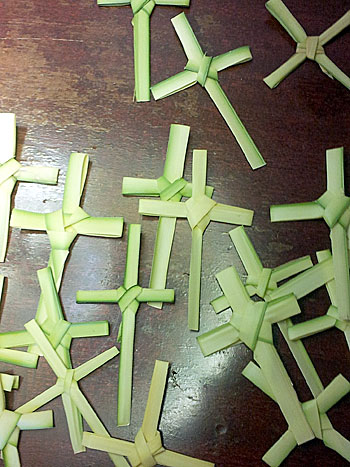Official Website of the
Catholic Diocese of Little Rock
Palm Sunday of the Lord’s Passion
Sunday, April 9, 2017
Location: All Parishes
"The very large crowd spread their cloaks on the road, while others cut branches from the trees and strewed them on the road. The crowds preceding him and those following kept crying out and saying: 'Hosanna to the Son of David; blessed is he who comes in the name of the Lord; hosanna in the highest.'" — Matthew 21:1-11
 According to the Catechism of the Catholic Church, "Jesus' entry into Jerusalem manifested the coming of the kingdom that the King-Messiah was going to accomplish by the Passover of his death and resurrection. It is with the celebration of that entry on Palm Sunday that the Church's liturgy solemnly opens Holy Week." (no. 560) This year, we celebrate Palm Sunday, also known as Passion Sunday, on April 9.
According to the Catechism of the Catholic Church, "Jesus' entry into Jerusalem manifested the coming of the kingdom that the King-Messiah was going to accomplish by the Passover of his death and resurrection. It is with the celebration of that entry on Palm Sunday that the Church's liturgy solemnly opens Holy Week." (no. 560) This year, we celebrate Palm Sunday, also known as Passion Sunday, on April 9.
The reason it is called Passion Sunday becomes evident as the tone of the Mass radically changes with the reading of Christ's passion and death as the Gospel for the day. The stark contrast between the people first welcoming Jesus and then turning on him, calling for his crucifixion, stands out in the experience of this feast day. Palms were used in Jewish tradition to celebrate triumph or victory. For Christians, the palm branch became a symbol of martyrdom.
Even the words used to praise Jesus as he entered Jerusalem have deeper meaning. The catechism explains that the word "hosanna" means "save" or "give salvation." This term along with the acclamation, "blessed is he who comes in the name of the Lord," is used during the Sanctus (Holy, Holy) of every Mass. It concludes the preface to the Eucharistic prayer "that introduces the memorial of the Lord's Passover. (no. 559)
The blessed palm frond that everyone receives at this Mass is a sacramental to take home. Traditionally Catholics keep their palms near or behind a crucifix, on a prayer altar or with their Bible. Keeping the palm serves as a reminder to remember Jesus' Passion and follow in his footsteps to carry the crosses in our own lives. Catholics are asked to bring their palms back a year later to be burned so the ashes can be used on Ash Wednesday to begin Lent anew.
For those who don't return their palms to be burned for Ash Wednesday and want to dispose of them properly, the same rule applies as with any blessed object. They should never be disposed of in the trash. The proper way is by burning or burial. With blessed palms, it would be appropriate to bury them in a flower garden at your home.









